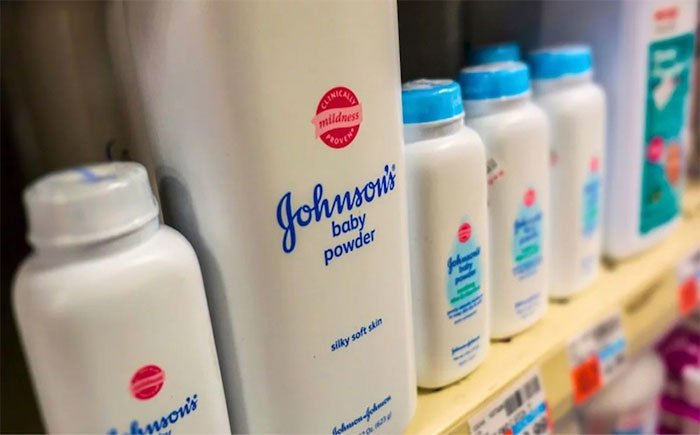
In one of the most significant courtroom defeats in its history, Johnson & Johnson has been ordered by a Los Angeles jury to pay $966 million in damages over claims that its once-flagship product — Johnson’s Baby Powder — contained asbestos, leading to a woman’s fatal case of mesothelioma.
The ruling, believed to be the largest mesothelioma-related verdict ever recorded, caps years of mounting legal and scientific scrutiny over the safety of the company’s talc-based products — a controversy that has eroded one of the most trusted brands in American consumer history.
The case was brought by the family of Mae Moore, who died in 2021 after being diagnosed with mesothelioma, a rare and aggressive cancer of the lungs caused exclusively by exposure to asbestos fibers.
According to court filings, Moore had used Johnson & Johnson’s baby powder for decades as part of her daily hygiene routine. Her family argued that trace amounts of asbestos — a known carcinogen — had contaminated the talc used in the powder, slowly poisoning her over time.
After weeks of testimony, the jury awarded $16 million in compensatory damages and a staggering $950 million in punitive damages, citing what it described as Johnson & Johnson’s “systematic failure to warn consumers” about potential health risks despite long-standing internal evidence of contamination.
Internal company records introduced during the trial showed that as early as the 1970s, some J&J officials were aware of test results detecting small amounts of asbestos in its talc supply. Yet the company chose not to alter its formula or issue public warnings, maintaining that its product was safe.
Independent lab reports, uncovered in prior litigation, had also detected asbestos fibers in several talc-based powders produced by J&J. In some instances, the tests were dismissed by company consultants as “non-representative,” a claim legal experts say has fueled allegations of corporate negligence.
“This verdict reflects years of willful denial,” said one attorney representing Moore’s family. “The documents speak for themselves — Johnson & Johnson knew of the risks but prioritized protecting its brand.”
Johnson & Johnson has faced more than 50,000 lawsuits nationwide linking its talc-based powders to both mesothelioma and ovarian cancer. In response, the company has repeatedly attempted to isolate its liabilities through complex bankruptcy filings — a strategy dubbed the “Texas Two-Step.”
Under this maneuver, J&J created a subsidiary to absorb talc-related claims and then sought bankruptcy protection for that entity. However, federal appeals courts have repeatedly blocked the move, ruling that the company remains financially capable of addressing claims directly.
Legal analysts say the Los Angeles verdict further complicates J&J’s defense strategy. “It sends a strong signal to juries and judges nationwide,” said Professor Daniel Berger, a product liability expert at UCLA Law. “Even with a pending bankruptcy tactic, courts are increasingly unwilling to allow large corporations to sidestep accountability.”
Johnson & Johnson ended production of its talc-based baby powder in North America in 2020, replacing it with a cornstarch-based formula. Despite the shift, company representatives continue to deny wrongdoing, asserting that “decades of independent testing confirm the safety and purity” of their talc products.
The company is expected to appeal the verdict, potentially seeking to reduce the punitive damages, which far exceed the compensatory award. Under a 2008 U.S. Supreme Court precedent, punitive damages typically may not exceed nine times the amount of compensatory damages — meaning the final payout could be reduced to about $144 million.
Still, analysts say the verdict’s symbolic impact could prove far more costly than the payout itself. “This decision pierces the myth of invulnerability around Johnson & Johnson,” said consumer safety advocate Lisa Brown. “It shows that even legacy brands can be held accountable when transparency fails.”
The ruling represents not just a legal milestone but a cultural reckoning for one of America’s most trusted names in personal care. Once a staple of family nurseries and hospital delivery rooms, Johnson & Johnson’s baby powder has now become a cautionary tale of corporate complacency in the face of scientific warning signs.
For the Moore family, the case was about more than money. It was about truth.
“We wanted accountability,” said a family member outside the courthouse. “Mae believed in that product all her life. It should have protected her — not killed her.”
As Johnson & Johnson prepares to appeal, the verdict stands as a sobering reminder: even century-old reputations can crumble when profit eclipses public safety.
While this $966 million ruling may ultimately be reduced on appeal — as the U.S. Supreme Court has previously ruled that punitive damages generally cannot exceed nine times compensatory damages — even a trimmed-down judgment would represent a major legal and reputational setback for Johnson & Johnson.
If reduced, the total could drop to around $144 million, still a landmark figure for a single mesothelioma case.
The case underscores a broader reckoning for consumer trust and corporate accountability. Once synonymous with purity and safety, Johnson & Johnson’s baby powder has become a symbol of how legacy brands can face devastating fallout when transparency is questioned.
For Mae Moore’s family, the verdict represents something more personal: acknowledgment. “No amount of money can bring Mae back,” a relative said tearfully. “But this is justice — and maybe it will save others.”
Lagos, Nigeria.
+234 913 161 4181
+234 803 961 8550
+234 802 321 3873
info@pepperroom.com.ng
© 2025 | 🌶️Pepper-Room - Everything Loud, Wild, and Worth Talking About. | All Rights Reserved.
Pepper-Room is not responsible for the content of external sites.